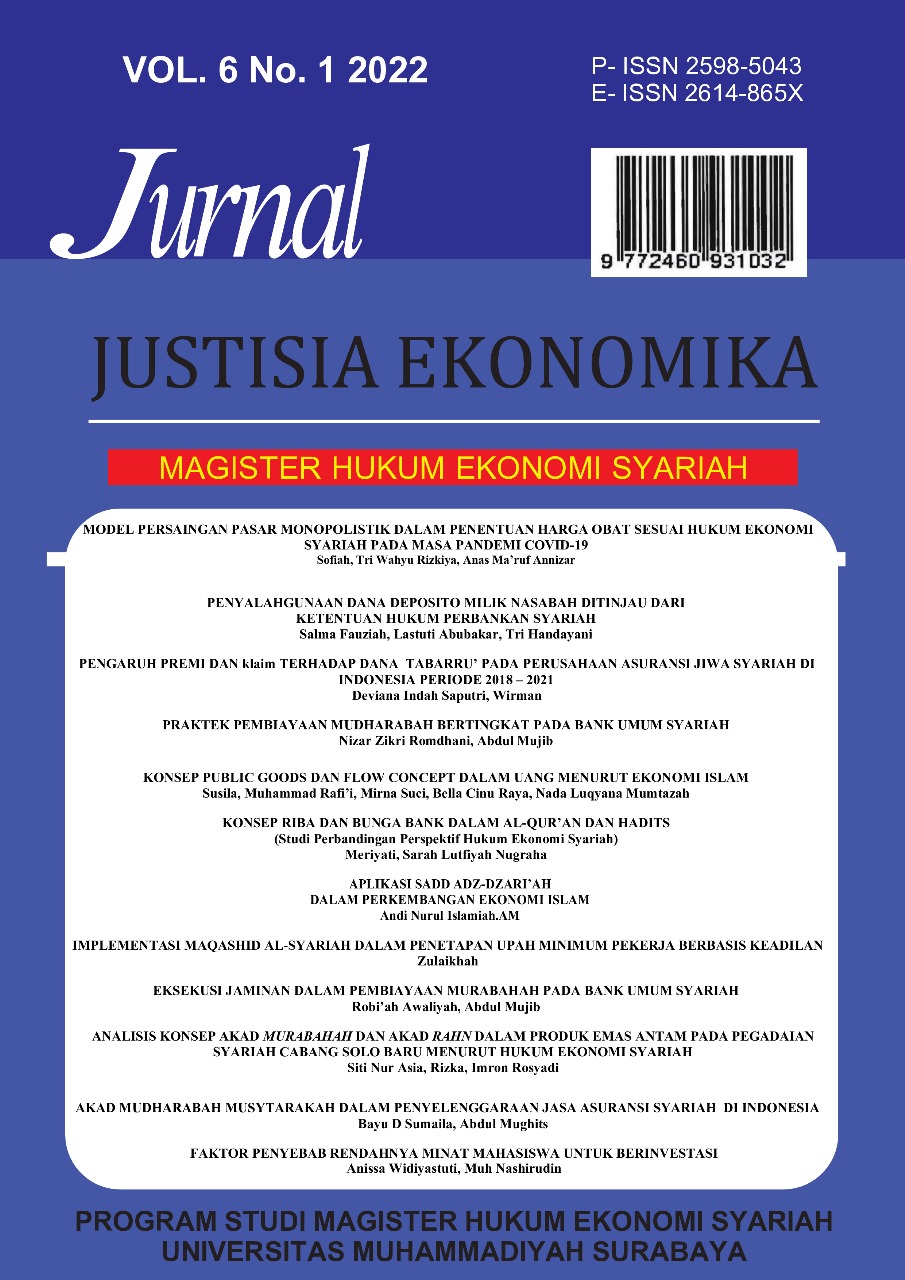KONSEP PUBLIC GOODS DAN FLOW CONCEPT DALAM UANG MENURUT EKONOMI ISLAM
DOI:
https://doi.org/10.30651/justeko.v6i1.12615Abstract
Islam views money as a medium of exchange, not as a commodity. Widespread awareness of the role of money aims to eliminate injustice and injustice in the exchange economy. they are classified as fadl riba. Exchange is an unrealistic method of exchange and proves the unimportance of the overall market mechanism. Literature study is data deepening based on theoretical studies and scientific work references. descriptive qualitative research. Data collection techniques in literature study, namely the collection of literature related to research, then analysis and conclusions about public goods, namely the general public can use it without disturbing the use by other people or certain parties. The money saved is not used for the manufacturing sector (idle assets). This amount is reduced because of the obligation of zakat on Muslims. So the money must be rotated (the concept of cash flow). Should not be productive and used as a transaction tool. Like the spirit of Fastabigul Hoyrot, Islam encourages competition in the economic field. alms, waqf, and other activities. The money must also be used for investments and contracts such as musyarokah, mudharabah, wadiah, qardh, and others, in the real sector, as exemplified by the Prophet Muhammad.
References
Afif, Mochammad. “Teori Permintaan Dan Konsumsi Inter-Temporal Antara Islam Dan Konvensional.†Jurnal Ekonomi Syariah 2, no. 2 (2019): 229–242.
Augusto Maria, José, I B. Panji Sedana, and Luh Gede Sri Artini. “Pengaruh Tingkat Suku Bunga, Inflasi Dan Pertubuhan Gross Domestic Product Terhadap Jumlah Uang Beredar Di Timor-Leste.†E-Jurnal Ekonomi dan Bisnis Universitas Udayana 10 (2017): 3477.
Endriani, Santi. “Konsep Uang: Ekonomi Islam VS Ekonomi Konvensional.†Anterior Jurnal 15, no. 1 (2015): 70–75.
Al Fasiri, Mawar Jannati, and Abdul Aziz. “Uang Dalam Tinjauan Ekonomi Islam.†Ecopreneur: Jurnal Ekonomi dan Bisnis Islam 2, no. 1 (2021): 95–104.
Febriansyah, Denny, and M Litt. “Tinjauan Hukum Islam Terhadap Transakasi Uang Elektronik.†Jurnal Iaitf Dumai 1, no. 2 (2019): 48–64.
Ghofur, Abdul. “Konsep Riba Dalam Al-Qur’an.†Economica: Jurnal Ekonomi Islam 7, no. 1 (2016): 1–26.
Ghufron, Moh Idil. “Peningkatan Produksi Dalam Sistem Ekonomi Islam Sebagai Upaya Pemberdayaan Ekonomi Umat.†Dinar 1, no. 2 (2015): 39–76. http://journal.trunojoyo.ac.id/dinar/article/view/2690.
Harahap, H. AmharMaulana. “Uang Dan Dinar.†Nahdatul Iqtishadiyah Jurnal Perbankan Syariah 1, no. 1 (2021): 1–23.
Harahap, Soritua Ahmad Ramdani. “Pemikiran Imam Al-Ghazali Tentang Fungsi Uang.†Laa Maisyir: Jurnal Ekonomi Islam 6, no. 1 (2019): 1–15.
Haryati, Mardhiyah. “Investasi Menurut Perspektif Ekonomi Islam.†Journal of IslamicEconomics and Business) 1, no. 1 (2016): 66–78. http://ejournal.radenintan.ac.id/index.php/ikonomika.
Huda, Miftahul. “Prinsip-Prinsip Keuangan Publik Islam.†Al-Intaj: Jurnal Ekonomi dan Perbankan Syariah 4, no. 1 (2018): 1–17.
Ichsan, Muchammad. “Konsep Uang Dalam Perspektif Ekonomi Islam.†Profetika: Jurnal Studi Islam 21, no. 1 (2020): 27–38.
Ilyas, Rahmat. “Konsep Pembiayaan Dalam Perbankan Syari ’ Ah Yan.†Penelitian 9, no. FEBRUARI (2015): 183–204.
———. “Konsep Uang Dalam Perspektif Ekonomi Islam.†BISNIS: Jurnal Bisnis dan Manajemen Islam 4, no. 1 (2016): 25–57.
Indrawati, Henny. Perspektif Ekonomi Syariah Dan Kesejahteraan. riau: UR Press Pekanbaru, 2015.
Kartawinata, Budi Rustandi, Aditya Wardhana, and Syahputra. Bisnis Internasional. PT.Karya Manunggal Lithomas, 2014.
Lestari, Linda. “Fiqih Iqtishad Sebagai Sumber Pengembangan Ekonomi Dan Keuangan Islam.†Jurnal Hukum Ekonomi Islam ( JHEI ) 5, no. 2 (2021): 95–110.
Mellor, Mary. “Could the Money System Be the Basis of a Sufficiency Economy?†real-world economics review, no. 54 (2010): 79–88. Accessed January 24, 2022.
Nafis, M. Cholil. Teori Hukum Ekonomi Syariah. Jakarta: Penerbit Universitas Indonesia (UI-Press), 2011.
Nofrianto. “Distribusi Pendapatan Dan Pemenuhan Kebutuhan Dalam Ekonomi Islam.†Innovatio VIII, no. 2 (2009): 375–396.
Nurlaili. “Uang Dalam Prespektif Ekonomi Islam (Depresiasi Nilai Rupiah).†IKONOMIKA: Jurnal Ekonomi dan Bisnis Islam 1, no. 1 (2016): 79–91.
Parlembang, Heru. “Analisis Pengaruh Jumlah Uang Beredar, Suku Bunga SBI, Nilai Tukar Terhadap Tingkat Inflasi.†Media Ekonomi 19, no. 2 (2010): 1–20. https://trijurnal.lemlit.trisakti.ac.id/medek/article/view/2251/1937.
Pertiwi, Dian. “Uang Dan Konsep Time Value Of Money Dalam Pandangan Islam.†ESA: Jurnal Ekonomi Syariah 2, no. 1 (2019): 90–105. http://ejournal.iaimbima.ac.id/index.php/jesa/article/view/258/175.
Querbes, Adrien. “Banned from the Sharing Economy: An Agent-Based Model of a Peer-to-Peer Marketplace for Consumer Goods and Services.†Journal of Evolutionary Economics 28, no. 3 (2018): 633–665.
Rahmawaty, Anita. “Uang Dan Kebijakan Moneter Dalam Perspektif Ekonomi Islam.†Equilibrium 1, no. 2 (2013): 181–199.
Rini, Nova. “Model Wakaf Uang Pada Pembiayaan Barang Publik Di Indonesia.†Fidusia : Jurnal Keuangan Dan Perbankan 3, no. 1 (2020): 34–47.
Rosia, Rina. “Pemikiran Imam Al-Ghazali Tentang Uang.†Jurnal Ilmiah Ekonomi Islam 4, no. 01 (2018): 14–27.
Siddiqui, Kalim. “The Political Economy of Essence of Money and Recent Development.†International Critical Thought 9, no. 1 (2019): 85–108.
Subaidi, Subaidi. “Keunggulan Dinar Dan Dirham Sebagai Mata Uang Menurut Al-Ghazali Dan Ibnu Taimiyah.†Istidlal: Jurnal Ekonomi dan Hukum Islam 2, no. 1 (2018): 60–72.
Weny, Nelman Asrianus. “Uang Dan Keterasingan.†Indonesian Journal of Theology 2, no. 6 (2018): 204–226.
Downloads
Published
How to Cite
Issue
Section
License
HAK CIPTA
Penulis yang mengirimkan artikel dalam jurnal Justisia Ekonomika harus memahami dan menyetujui persyaratan tentang hak cipta jurnal Justisia Ekonomika sebagai berikut:
1. Hak Cipta tulisan / artikel yang diterbitkan di jurnal Justisia Ekonomika otomatis menjadi hak pengelola jurnal atau publisher
2. Meskipun Hak Cipta atas tulisan yang telah diterbitkan di jurnal Justisia Ekonomika adalah menjadi haknya publisher, tetapi penulis masih mempunyai hak untuk : a). Penulis boleh meng-upload di repository kampus, b). Penulis boleh meng-upload di webnya sendiri, c). Penulis boleh meng-upload di google schoolar, orchid dan sinta
LISENSI
Lisensi atas tulisan / artikel yang diterbitkan di jurnal Justisia Ekonomika adalah menggunakan Creative Commons dengan atribusi CC-BY-NC 4.0






















